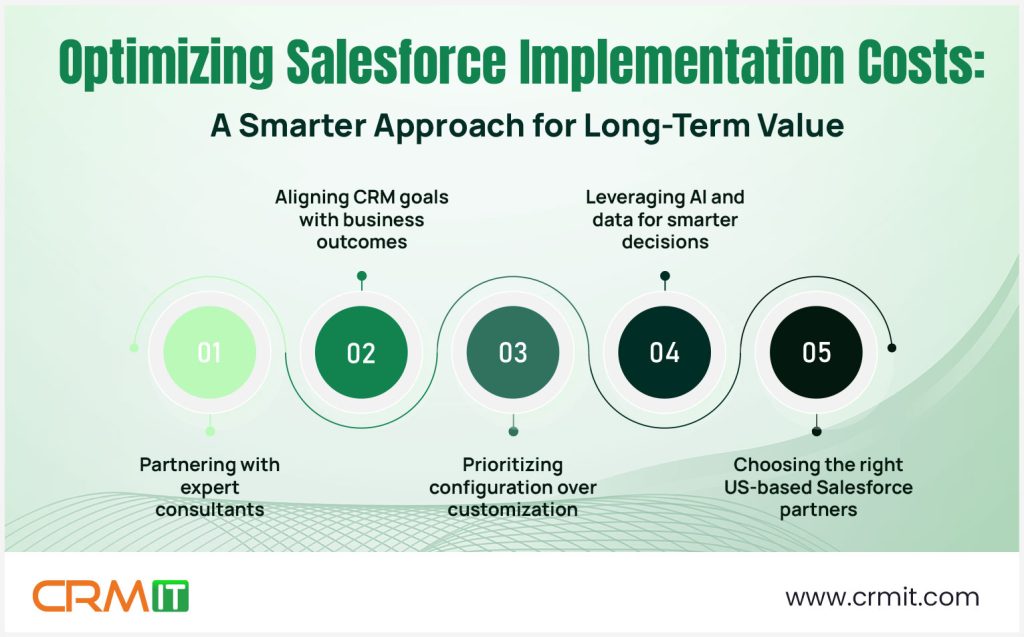Optimizing Salesforce Implementation Costs: A Smarter Approach for Long-Term Value

So, Salesforce, right?
It’s a super powerful platform. No brainer. Salesforce can totally change how you talk to your customers, how you manage all your data, and even help you make those big directional shifts in your business. But here’s the thing – and a lot of folks find this out the hard way – getting it set up and working just right?
That can be tricky. If you don’t go in with a really clear vision, a smart strategy, or the right people who know Salesforce inside and out, you can easily end up with costs you didn’t see coming, timelines that stretch out, and frankly, an outcome that’s a bit of a letdown.”
In this blog, we will explore how organizations can optimize their Salesforce implementation journey by creating a strategy that includes using a reputable Salesforce implementation consulting service before implementation, selecting reputable Salesforce implementation partners in the US and concentrating on outcomes that emphasize long-term genuine value versus quick wins.
How Implementation Costs Run Out of Hand – and What You Can Do About It
Salesforce implementation can be deceptively complicated, and many organizations accept project scopes without understanding internal readiness, data maturity, or specific business needs. Adequately addressing these challenges often leads to:
- Rework due to missing or unclear requirements
- Customization (at a cost) instead of configuration
- Disjointed system integration
- Lack of user adoption or gaps in training
In addressing these challenges, the focus should be on optimizing the implementation, not simply executing the implementation. This is the role of Salesforce implementation consulting services.
The Strategic Advantage of Expert Consulting Services
Expert consulting teams follow a systematic, outcome-based approach to deploying a Salesforce solution. They help you:
- Make sure Salesforce aligns with your business objectives: Before a single line of code is written, consulting teams make sure that your CRM strategy is geared toward achieving real-world business results, such as increased sales productivity, improved resolution times, and greater customer satisfaction.
- Design with an AI-first and data-first mindset: Most modern CRM implementations do not simply aim to automate existing workflows. They aim to transform how decisions are made, using Salesforce as the single source of truth for AI-driven recommendations, predictive analytics, and seamless customer interactions.
- Lower customization costs: A good consulting team can use Salesforce’s native features and low-code tools to satisfy your requirements without going down the expensive and harder to maintain custom development route.
- Ensure seamless data to decision flow: To help ensure your Salesforce instance becomes a real-time decision-making engine (not simply a data cupboard), consultants help design intelligent flowing integrations and break down these silos.
Choosing the Right Salesforce Implementation Partners in the US
Partnering with the right implementation team can greatly influence the success and total costs of your Salesforce journey. There are hundreds of Salesforce partners out there, so here is a to-do list for identifying the best Salesforce implementation partners:
- Industry experience: Partners with deep domain knowledge (e.g., healthcare, manufacturing, BFSI) have the ability to leverage pre-built solutions, relevant KPIs, and repeatable workflows that will dramatically reduce the time and cost of your implementation.
- Certified expertise and a proven history of success: Look for partners with Salesforce expertise in all of the products (Sales Cloud, Service Cloud, Marketing Cloud, etc.), service lines, and a portfolio of successful implementations.
- Scalability: The best partners design systems that give you room to grow – including AI-first use cases, API-led integrations and future roadmap engagement.
- Continued support and optimization: A true partner goes beyond the go-live date. Look for teams that also offer managed services, continuous optimization, and roadmap alignment around constantly evolving user needs.
Local Presence Matters
Choosing Salesforce implementation partners in the US can also offer advantages in terms of time zone alignment, compliance with local regulations (such as HIPAA or CCPA), and faster onsite engagement when needed. While global delivery models remain effective, having a trusted local anchor ensures communication is seamless and contextual.
Cost Optimization: Think Long-Term, Not Just Upfront
There is a difference between being cost-effective and cutting corners. Being cost-effective involves:
- Preventing unnecessary and reservedly expensive rework through real planning and discovery
- Preventing manual overhead by automating repeating tasks
- Using AI for predicting and creating better service orchestration
- Focusing on creating user-friendly solutions overall improves adoption
Decision makers must weigh not just the cost to initially implement, but the value received with time – value the includes quicker time to value, better consumer experience, increased organizational agility.
A Data-to-Decision Mindset
A common trend in progressive enterprises is that Salesforce is not just a CRM; it serves as a decision transformation machine. When implemented with that approach, Salesforce can connect data from across systems, apply AI to elicit actionable insights, and empower each team member – from marketing to support – enabling them to make faster and better decisions.
This represents the transition from managing information to mobilizing, from data to strategy and strategy to impact.
Conclusion
So, in today’s world, where everything’s going digital and AI is popping up everywhere, getting Salesforce right isn’t just about plugging in a new system anymore.
It’s really about setting yourself up for smarter business results ? And how do you do that?
Well, a big part of it is picking Salesforce consultants who really know their stuff. It also means teaming up with partners you can trust – if you’re in the US, finding good folks there. Plus, you’ve got to think long-term, about how this system will grow with you. If you nail those things, your company can get some serious value out of Salesforce, all while keeping an eye on the budget.
So, if you’re just starting out with Salesforce, or maybe you’re looking to make your current setup even better, just remember this: good, efficient solutions always kick off with making smart, informed choices from the get-go.”